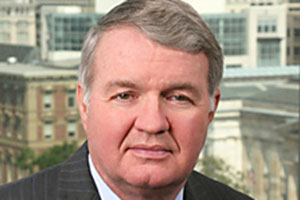Senior Reporter
Former Transportation Chief James Burnley Foresees Funding to Dominate Early DOT Agenda

WASHINGTON — Crafting a meaningful funding proposal for the network of roads, pipelines and freight corridors is likely to consume the first few weeks of Elaine Chao’s tenure as secretary of transportation, former Secretary James Burnley said Jan. 26.
“It’s quite obvious, I think, that she’ll have to focus on trying to come up with an infrastructure plan to meet President Trump’s request in that area that a plan be put together,” Burnley told Transport Topics at the Eno Center for Transportation’s policy conference. He is chairman of the center’s board of directors.
Burnley suggested the administration consider the possible benefits of an infrastructure bank. With an infrastructure bank, funded with a portion of taxes generated by repatriating offshore profits, Burnley explained, Congress would be able to boost dollars for the big-ticket projects states are struggling to finance.
He noted that Rep. John Delaney (D-Md.) has introduced legislation that would establish such a bank.
The Senate intends to vote Jan. 31 on Chao’s nomination to lead the U.S. Department of Transportation, Republican leaders indicated.
At her confirmation hearing this month, Chao emphasized public-private partnerships (P3s) would be an ideal funding mechanism to finance infrastructure projects. A plan Trump’s advisers promoted in October called for providing $137 billion in tax credits for the private sector to achieve a $1 trillion investment in infrastructure over 10 years. Trump promised to deliver an infrastructure plan to Congress during his first 100 days in office.
It is unclear when Republican leaders will advance legislation aimed at modernizing freight corridors, structurally deficient bridges and old pipelines. Sen. John Thune (R-S.D.), the chairman of the party’s policy conference, told reporters in Philadelphia on Jan. 25 that an infrastructure package was not atop the Republicans’ list of priorities, even though Senate Democrats had unveiled a $1 trillion infrastructure measure earlier in the week.
“An infrastructure bill will have to go through Congress. Obviously, it will have to be funded, and so Congress will have an opportunity to help shape that,” Thune, also the chairman of the Commerce Committee, said at a press conference carried via C-SPAN. “How infrastructure plays into that, we’re not sure yet. … At this point, that’s probably a preliminary discussion to have.”
Thune suggested a tax overhaul measure would be one approach to advancing an infrastructure funding package. Wisconsin Republican Paul Ryan, the speaker of the House, has yet to say when the chamber would take up a tax reform bill, and he told reporters Jan. 26 that discretionary legislation would need to reflect the party’s philosophy.
“We are fiscal conservatives,” Ryan said at another press conference carried by C-SPAN. “What it means is government should not live beyond its means.”
Ryan’s Senate counterpart, Majority Leader Mitch McConnell (R-Ky.), has indicated he would oppose an infrastructure package not paid for and that adds to the national debt. McConnell is Chao’s husband.
Republicans meeting in Philadelphia outlined a 200-day action plan focused on reversing policy on health care, funding for social services and environmental regulations.




